Material Wealth: Mining The Personal Archive Of Allen Ginsberg
February 2024
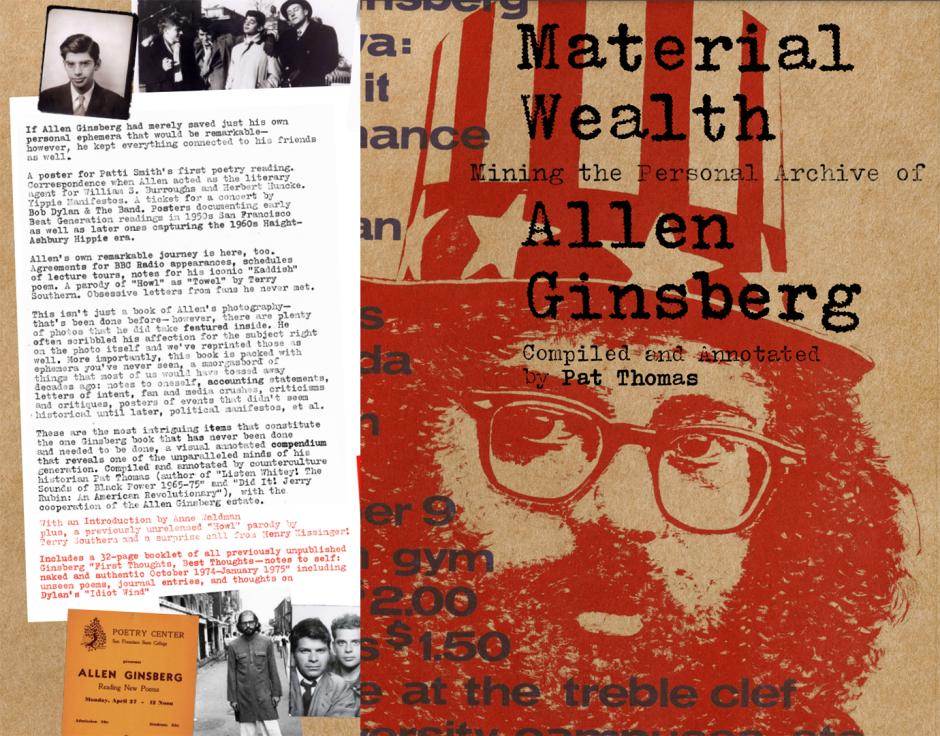
Material Wealth front and back cover (crop)
Author Pat Thomas selects and annotates spreads from his new book built from the archive of American poet and writer Allen Ginsberg
Allen Ginsberg wasn’t actually into “Material Wealth” – he lived frugally even during the height of his fame, giving his money to lesser known poets and supporting civil rights and fighting injustice. So, the title of my new Allen Ginsberg book Material Wealth: Mining The Personal Archive Of Allen Ginsberg is taken from Bob Dylan’s recent comment: “Seeing Ginsberg was like going to see the Oracle of Delphi. He didn’t care about material wealth or political power. He was his own kind of king.”
This book contains Ginsberg’s intellectual, historical and literary wealth as a visual annotated collection of unpublished paperwork, graphics, photographs and ephemera that documents Ginsberg’s life experiences as a breakaway poet, expansive spirit, curious intellectual traveller and a relentless enthusiast of provocative yet spiritual pursuits of writing, art, music and culture.
If Allen had merely saved just his own personal ephemera that would be remarkable – however, he kept everything connected to his friends as well. A poster for Patti Smith’s very first poetry reading. Piles of correspondence when Allen acted as the literary agent of William S Burroughs. Various Yippie manifestos. A ticket stub for a 1974 concert by Bob Dylan & The Band with Yoko Ono’s phone number scribbled on the back. Posters documenting early Beat Generation readings in 1950s San Francisco as well as later ones capturing the Haight-Ashbury hippie era and much more – including a detailed essay of Ginsberg’s recorded works with the likes of Bob Dylan, Paul McCartney, Elvin Jones, Don Cherry, Lenny Kaye, Philip Glass, David Amram, Arthur Russell and Marc Ribot.
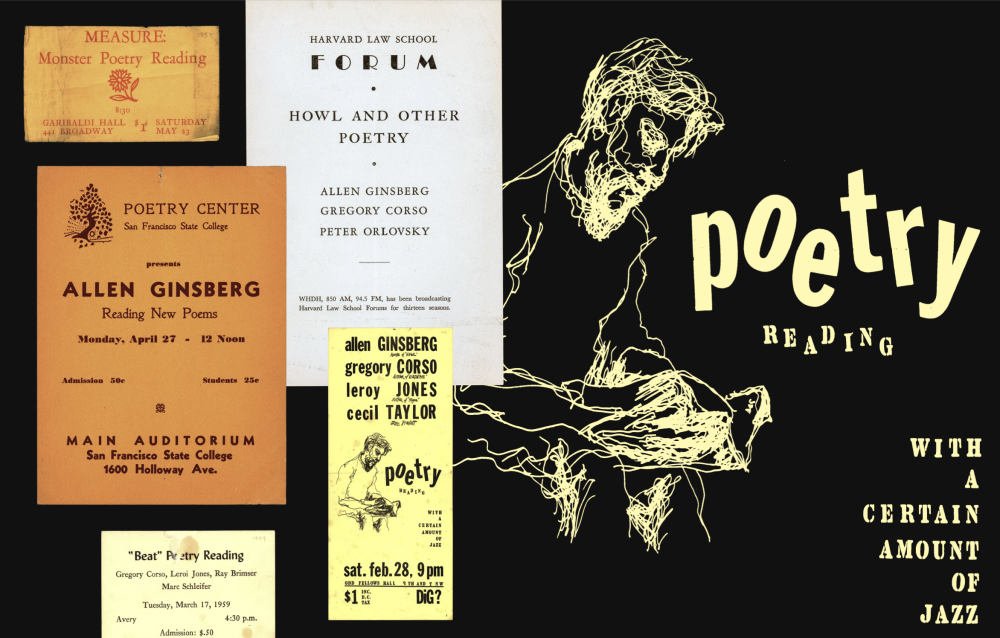
Pages 68–69: Various posters from the 1950s–60s
These posters from late 1950s-early 1960s San Francisco and New York City capture Allen and his fellow writers at the height of their Beat Generation fame. Sadly, the beatnik vibe of beards and bongos quickly became a cliche – but that wasn’t Allen Ginsberg or Gregory Corso or LeRoi Jones (Leroy is a misspelling – later known as Amiri Baraka). These guys were driven by words and intellect (with spiritual overtones), not looking for kicks on Route 66. Also note the presence of pianist Cecil Taylor – jazz was the soundtrack to this movement, as captured by Jack Kerouac in several books and by John Clellon Holmes in The Horn.
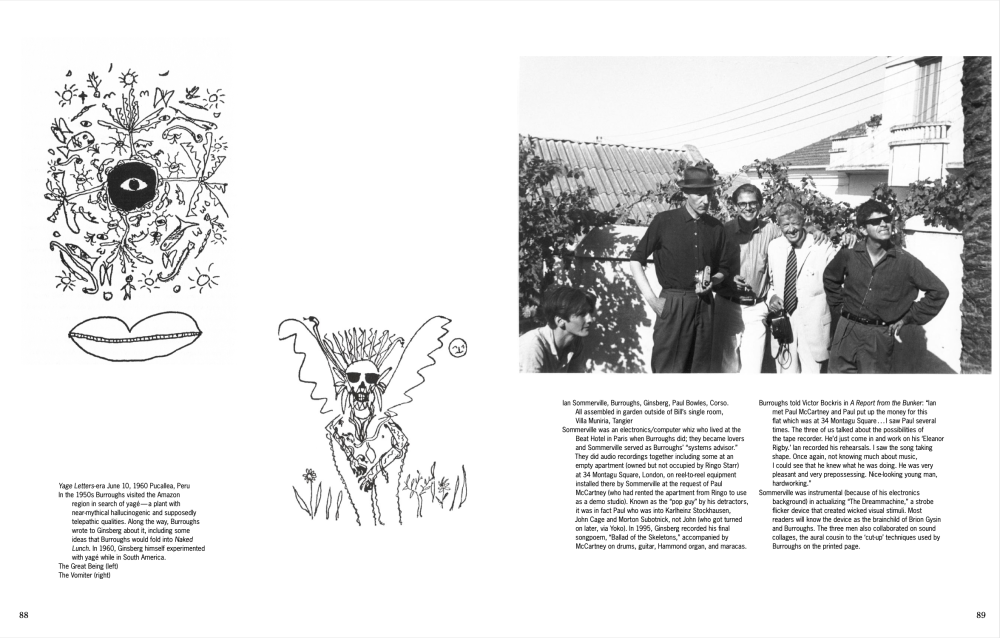
Pages 88–89: Photos of beats in North Africa, plus several paragraphs on electronic tape experiments
The relationship between Allen Ginsberg, William Burroughs and Paul McCartney goes back to the mid-1960s Beatles era. It was Paul, not John Lennon who first explored the idea of avant garde recordings. This connection came full circle in 1995, when Allen visited the former Beatle at his home in England. Allen recited a new poem The Ballad Of The Skeletons to Paul who suggested he provide the music to a performance at London’s Royal Albert Hall, followed by a studio recording accompanied by Philip Glass, Lenny Kaye and Marc Ribot. That recording has just been released on the Allen Ginsberg soundtrack CD to the book, also titled Material Wealth.
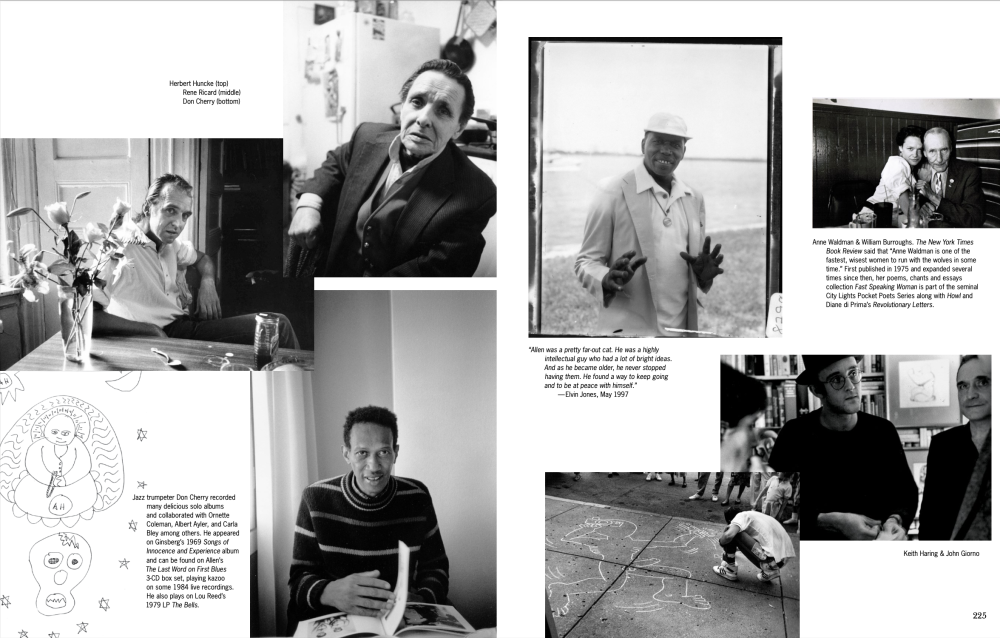
Pages 224–225: Photos of Don Cherry and Elvin Jones
As early as 1969, Don Cherry and Elvin Jones were recording with Allen Ginsberg. They participated in the sessions for the album Songs Of Innocence And Experience, on which Ginsberg set William Blake poems to music. The new Material Wealth CD includes an unreleased recording of Allen and Elvin in a poetry slam versus drum battle titled “Hum Bom!” that is a dynamic anti-war message. Don Cherry occasionally performed live with Allen in the 1980s and 90s.
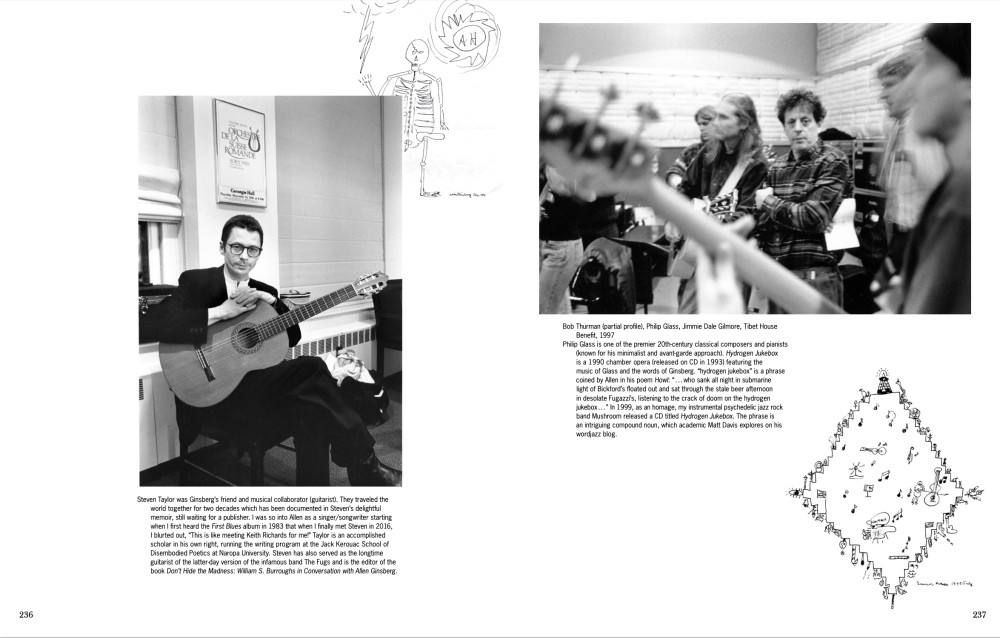
Pages 236–237: Photos of Steven Taylor and Philip Glass
Hydrogen Jukebox is a 1990 chamber opera (later released on CD) of Philip Glass music and Allen Ginsberg words. Its name is taken from Ginsberg’s iconic 1955 poem Howl. Hydrogen Jukebox captures the American cultural landscape from the 1950s to 1980s with reflections on the Vietnam anti-war movement, the sexual revolution, drugs, Eastern philosophy and environmental issues.
Material Wealth: Mining The Personal Archive Of Allen Ginsberg book is published by Powerhouse and distributed in the UK by Turnaround. The Material Wealth soundtrack CD is released by Heyday Again and distributed in the UK by Proper.
Author Pat Thomas will be speaking about Allen Ginsberg at London The Horse Hospital (7 & 15 March); Dublin The New Theatre (12 March); Leeds Hyde Park Book Club (17 March); Paris Shakespeare And Company (21 March).
Leave a comment